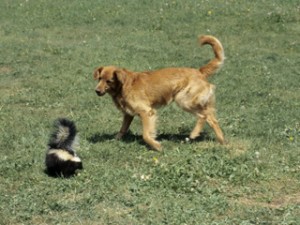 Allentown, PA – Being the victim in a skunk spray situation is among the worst of nightmares. Not only is the smell absolutely awful, but the substance is oily and seems to repel water. In fact, water actually intensifies the smell. Most people are at a loss for what to do to remove the smell from the family dog.
Allentown, PA – Being the victim in a skunk spray situation is among the worst of nightmares. Not only is the smell absolutely awful, but the substance is oily and seems to repel water. In fact, water actually intensifies the smell. Most people are at a loss for what to do to remove the smell from the family dog.
The first thing many think to do is to put poor scruffy in the bathtub, run the water full blast, and lather him with tomato juice…Wrong, wrong, and wrong! Other research provides options to remove the skunk smell from the dog, however nothing is guaranteed. Veterinarian, Erin Troy, says, “There are a lot of formulations out there and in my experience none of them are a cure-all but most of them help.”
One homemade mixture consists of 1 Quart Hydrogen Peroxide, 1/4 Cup Baking Soda, and 1 to 2 Teaspoons of liquid soap. Do not soak your dog prior to bathing him. Combine these three ingredients in a plastic container (the mixture will fiz because of the chemical reaction). Cleanse the affected areas by massaging the mixture into the dog’s fur, using a washcloth or sponge. Let the solution sit on your dog for 5 minutes, then rinse well with lukewarm water. Repeat washing until the smell is gone. Do not put mixture into a spray bottle, as the pressure could cause the bottle to explode, and do not store it – use immediately.
This solution works well, but the scent may linger for a few weeks. A variety of products, which can also be used for skunk smell removal on clothing, furniture, people, carpets, and other contaminated surfaces, are available at most pet stores. Because they typically come in a bottle with a squirt tap, it is easy to apply the solution to the affected areas and massage in with a saturated washcloth.
Pet owners are encouraged not to use mothballs as skunk repellents, due to the harmful effects if ingested. Mothballs are actually made of two highly toxic chemicals, paradichlorobenzene and naphthalene. These chemicals are only effective in high concentrations, which is where the problem lies. In order for mothballs to work effectively as a skunk deterrent, you have to use so many of them that it becomes hazardous to anyone exposed to them.
Paradichlorobenzene and Naphthalene have both been reported to damage the liver and kidneys in high doses, as well as cause eye injury. Mothballs can be especially dangerous if swallowed.





